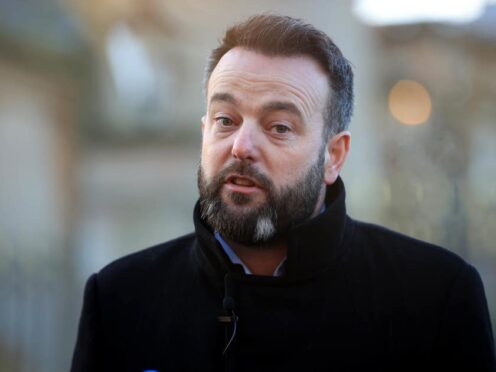
SDLP leader Colum Eastwood will not be prosecuted for walking with the Bloody Sunday families to court in Londonderry last year.
The Public Prosecution Service in Northern Ireland has said that seven people who took part in the walk on August 25 will not be prosecuted for taking part in an unnotified procession.
Mr Eastwood, the Foyle MP, joined the Bloody Sunday families on the march to Bishop Street court for a hearing in relation to the prosecution of Soldier F.
However, after a complaint by loyalist activist Jamie Bryson, police investigated and a file was sent to the Public Prosecution Service.
The PPS decision today is the right one. Bloody Sunday Families walked together to court on an important day in their fight for justice.
The complaint was disgraceful. The process has been appalling. The focus now should be justice for the families – where it should always be.
— Colum Eastwood (@columeastwood) February 22, 2024
At issue was whether the event fell under legislation in Northern Ireland that requires organisers of public processions to give advance notice to the Parades Commission.
It is an offence to organise or participate in an unnotified parade or related protest.
The PPS said that after “careful consideration of all evidence submitted by police and the full context in which the procession took place, decisions were taken not to prosecute all seven on public interest grounds”.
The PPS said the procession involved a small number of people, it was peaceful and caused no public disorder, there was no inconvenience to traffic or the public and no complaints from members of the community.
A PPS spokeswoman said: “It was considered that the conduct of the reported individuals did amount to participation in a public procession and that their procession had not been subject to the legal notification required.
“However, the purpose of having legislative regulation of parades and processions in Northern Ireland is to control public disorder and damage, to minimise disruption to the life of the community and to enhance community relations.
“In this particular case, it was clear that the procession investigated did not raise any of those risks and therefore the public interest would not be served by pursuing criminal proceedings.
“This decision was reached impartially, independently and fully in line with the PPS Code for Prosecutors.
“Each case reported by police is considered carefully, taking into account the specific facts and circumstances of the alleged offending.
“These decisions are therefore fact-specific and no indication of a general policy position in relation to the prosecution of unnotified processions or parades.”
Mr Eastwood said: “The people of Derry have been standing with the Bloody Sunday families for over 50 years and nothing will ever change that.
“The PPS decision today is the right one.
“Families who walked to court together and were joined by their representatives should not have been put through this ordeal on top of 50 years of injustice. I am glad that common sense has at last prevailed.
“This entire process has added more hurt to families who have endured decades of pain.”
Ciaran Shiels from the Madden & Finucane legal firm, represents a number of the Bloody Sunday families.
He said: “This is a victory for common sense. We welcome the PPS decision in this matter, which applies to all those potentially facing criminal prosecution.
“This was a matter that never should have troubled the PPS, who have genuine and serious criminal cases that require to be progressed through the courts.
“This case could not possibly have passed the ‘interests of justice’ limb of the well-known legal test for prosecution.
“The decision taken by the PPS this morning was the only sensible and rational decision that could be taken in the circumstances.
“However, in stark contrast, the PSNI, at the highest level, have extremely serious questions to answer.”
Mr Bryson said the PPS decision was “extraordinary”.
He said: “The PPS have held the law was broken, and the evidential test was met, but then have bent themselves into all sorts of intellectual shapes to justify not prosecuting in the public interest.
“They have set out four criteria for the public interest, none of which they consider when deciding whether to prosecute unionists/loyalists under the parading legislation.
“Extraordinarily, the PPS then say this approach will not be a ‘general policy’ but instead will only apply to the facts of this case.”

Soldier F, a former paratrooper who cannot be identified, is accused of murdering James Wray and William McKinney when members of the Parachute Regiment shot dead 13 civil rights protesters on the streets of Derry in 1972 in an event known as Bloody Sunday.
He is also charged with five attempted murders.
Regarded as one of the darkest days of the Troubles, 13 people were killed on Bloody Sunday and another man shot by paratroopers died four months later.
Many consider him the 14th victim of Bloody Sunday but his death was formally attributed to an inoperable brain tumour.
Mr Bryson has also reported Mr Eastwood to Parliament’s standards watchdog, after the SDLP leader walked out of a Derry police station in December, where he had been asked to attend an interview about the procession last August.
Mr Bryson accused Mr Eastwood of seeking to “place himself above the law”.

Enjoy the convenience of having The Sunday Post delivered as a digital ePaper straight to your smartphone, tablet or computer.
Subscribe for only £5.49 a month and enjoy all the benefits of the printed paper as a digital replica.
Subscribe